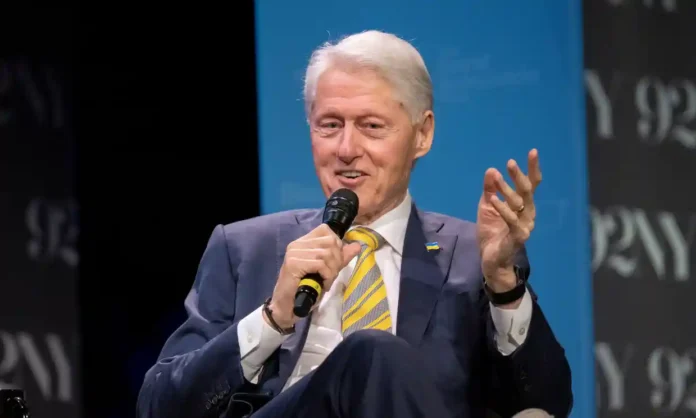Revelation raises questions about whether US and Europe should have been more prepared for 2014 invasion
Vladimir Putin told Bill Clinton three years before his 2014 attack on Ukraine that he was not bound by the Budapest Memorandum guaranteeing the country’s territorial integrity, according to the former US president.
The revelation raises questions about whether the US and its European allies should have been more prepared for the 2014 attack, when Russia annexed Crimea and attacked the Donbas.
Clinton said he had talked to the Russian president at the 2011 World Economic Forum in Davos, where Putin brought up the issue of the memorandum, under which Ukraine, Belarus and Kazakhstan agreed in 1994 to give up the nuclear arsenal they inherited on their territory from the Soviet Union, in return for assurances their sovereignty would be respected “within existing borders”.
It was signed by Boris Yeltsin on behalf of Russia, Clinton for the US, and John Major on behalf of the UK, acting as a third guarantor nation.
“Putin told me in 2011, three years before he took Crimea, that he did not agree with the agreement I made with Boris Yeltsin, that they would respect Ukraine’s territory if they gave up their nuclear weapons,” Clinton said on Thursday at a public discussion at 92nd Street Y, a Jewish cultural and community centre in New York.
“Putin said to me: ‘… I know Boris agreed to go along with you and John Major and Nato, but he never got it through the Duma [Russian parliament]. We have our extreme nationalists too. I don’t agree with it and I do not support it and I’m not bound by it.’
“I knew from that day forward, it was just a matter of time,” the former president said of Putin launching an attack.
The Russian leader had already launched an invasion of Chechnya in 1999, and Georgia in 2008.
After the seizure of Crimea in 2014, Putin claimed Russia was not bound by the Budapest Memorandum because the Maidan revolution and change of government in Kyiv earlier that year meant Ukraine had become a different state. “In respect to this state, we have not signed any obligatory documents,” he said.
However, his conversation with Clinton suggests Putin had decided not to honour the agreement years before the Maidan uprising.
Daniel Fried, a former assistant secretary of state for European and Eurasian affairs, said Putin’s remarks to Clinton were not made widely known among members of the Obama administration, but added he assumed the former president must have told his wife, Hillary, who was secretary of state.
Fried, now a fellow at the Atlantic Council, said Putin had threatened Ukrainian territorial integrity three years before the Davos meeting with Clinton, at a Nato-Russia council meeting in April 2008, during the Bush administration. Putin declared that when Crimea had been transferred from the Russian Soviet Federative Socialist Republic to the Ukrainian Soviet Socialist Republic in 1954 “not all legal procedures were followed”.
Fried said: “I was present, sitting next to the then Polish national security adviser, Mariusz Handzlik. We both stood up in alarm and turned to each other, saying, ‘Did you just hear what I heard?’
“From that moment, I thought Putin would turn on Ukraine and said so to Condi Rice and Steve Hadley,” he added, referring to the secretary of state and national security adviser respectively in the Bush administration.
“The US government was surprised by the Crimean operation but should not have been, given the warnings,” Fried said.
This week marks the 30th annual World Press Freedom Day, a day for everyone to reflect on the importance of free expression as fundamental for all other rights. It is also an opportunity to pledge support for independent media – because without a robust and free press, a healthy democracy is impossible.
As you’re joining us today from Greece, we hope you will consider marking this day by supporting the Guardian. Despite the financial challenges plaguing the media industry, we’ve decided to keep our journalism paywall-free, because we deeply believe everyone has the right to access high-quality, fact-checked reporting. And we maintain our independence thanks to generosity from readers all over the world, who understand that supporting the free press is an investment in an informed and empowered public.
Unlike many others, we have no billionaire owner – this helps us maintain the freedom to fearlessly chase the truth and report it with integrity. Your support will allow us to continue to work with trademark determination and passion to bring you journalism that’s always free from commercial or political interference.
Today we ask you to power Guardian reporting for the years to come, whether with a small sum or a larger one. If you can, please support us on a monthly basis from just €2. It takes less than a minute to set up, and you can rest assured that you’re making a big impact every single month in support of open, independent journalism. Thank you.




